Matières à Réflexions
1 juillet 2024
Base Documentaire : Doctrine
► Référence complète : M. Tirel, "Publication de la directive CS3D : consécration du devoir de vigilance européen", Dr. sociétés, n°7, juillet 2024, comm. 101, pp. 37-40
____
► Résumé (fait par l'auteure) : "Objet. – Après son adoption définitive par le Parlement européen et le Conseil le 24 mai dernier (avec 17 votes pour et 10 abstentions), la directive sur le devoir de vigilance (Corporate sustainability due diligence directive, dite CS3D), a été publiée au JOUE le13 juin 2024.
Portée. – Tel que l'ambitionnait la Commission européenne, ce texte s'inspire de la loi française du 27 mars 2017 tout en remédiant à certaines de ses lacunes, bien que les ambitions premières que le texte portait ont été nettement revues à la baisse.".
____
🦉Cet article est accessible en texte intégral pour les personnes inscrites aux enseignements de la Professeure Marie-Anne Frison-Roche
________
28 juin 2024
Base Documentaire : Doctrine
► Référence complète : E. Netter, "Quand la force de conviction du scoring bancaire provoque sa chute. L'interprétation extensive, par la CJUE, de la prohibition des décisions entièrement automatisées", RTD com., 2024, chron., pp.342-348
____
🦉Cet article est accessible en texte intégral pour les personnes inscrites aux enseignements de la Professeure Marie-Anne Frison-Roche
________
28 juin 2024
Base Documentaire : Soft Law

► Référence complète : Autorité de la concurrence (ADLC), avis 24-A-05 du 28 juin 2024 relatif au fonctionnement concurrentiel du secteur de l’intelligence artificielle générative, juin 2024, 104 p.
____
____
📰lire le communiqué de presse accompagnant la publication de l'avis
________
24 juin 2024
Conférences
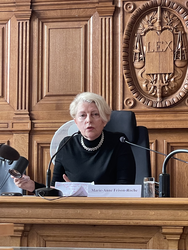
► Référence complète : M.-A. Frison-Roche, "Les deux rencontres entre l'intelligence artificielle et le Contentieux Systémique", in L’intelligence artificielle, nouveau champ de contentieux systémique, in cycle de conférences-débats "Contentieux Systémique Émergent", organisé à l'initiative de la Cour d'appel de Paris, avec la Cour de cassation, la Cour d'appel de Versailles, l'École nationale de la magistrature (ENM) et l'École de formation des barreaux du ressort de la Cour d'appel de Paris (EFB), sous la responsabilité scientifique de Marie-Anne Frison-Roche, 24 juin 2024, 11h-12h30, Cour d'appel de Paris, salle Cassin
____
🧮consulter le programme complet de cette manifestation
____
► Résumé de la conférence : Dans la présentation générale sur le thème lui-même, j'ai souligné "Les deux rencontres entre l'intelligence artificielle et le Contentieux Systémique".
La perspective retenue dans la conférence n'est pas l'état de ce qui est convenu d'appeler l'"Intelligence Artificielle", mais bien la façon dont on doit corréler ici l'IA et le "Contentieux Systémique Émergent" (CSE).
Cela suppose de rappeler ce qu'est un "contentieux systémique" (1), puis de voir l'apport de l'intelligence artificielle pour traiter ce type de contentieux (2), avant de voir que le système algorithmique lui-même peut être l'objet de Contentieux Systémique (3).
1. Ce qu'est le Contentieux Systémique que l'on voit Émerger
Sur la notion même de "Contentieux Systémique Émergent", proposée en 2021, lire : M.-A. Frison-Roche, 🚧L'hypothèse de la catégorie des causes systémiques portés devant le juge, 2021.
Ce Contentieux Systémique Émergent vise des situations dont la connaissance est portée devant le juge et dans lesquelles un système est impliqué. Il peut s'agir du système bancaire, du système financier, du système énergétique, du système numérique, du système climatique, du système algorithmique.
Dans ce type de contentieux, les intérêts et l'avenir du système lui-même sont "en cause". Le juge doit donc les "prendre en considération"📎
En cela, le "Contentieux Systémique" doit se distinguer du "contentieux de masse". Le "contentieux de masse" vise des litiges très nombreux et analogues. Le fait qu'ils soient souvent de "faible importance" n'est pas forcément déterminant, car ces litiges sont importants pour les personnes en cause (cf. l'article déterminant de Carbonnier, "De Minimis...", 1981)📎
2. L'apport de la puissance algorithmique dans la menée d'un Contentieux Systémique
À ce titre, l'IA peut être un outil utile, voire indispensable, pour maîtriser de tels Contentieux Systémiques, dont l'émergence correspond à une nouveauté et dont la connaissance est portée devant le juge de droit commun.
En effet, ce type de contentieux est particulièrement complexe et long, les questions probatoires étant au centre, les expertises succédant aux expertises. L'appréciation des expertises est difficile à mener. L'IA peut alors être un moyen pour le juge, afin de juguler de risque accru de capture par les experts de son devoir de décision, de maîtriser la dimension expertale du Contentieux Systémique.
Le choix des techniques d'IA présente les mêmes difficultés que celles exposées depuis toujours à propos des experts. Il est probable que des mécanismes de certification, analogues à l'inscription sur des listes d'experts, se mettent en place, si l'on s'écarte de la construction par les juridictions elles-mêmes (ou par le gouvernement, ce qui peut poser un problème d'indépendance de la justice), ou si l'on veut un contrôle sur des outils fournis par les parties elles-mêmes, au regard du principe de l'égalité des armes, en raison du coût de ces outils.
3. Lorsque c'est le système algorithmique lui-même qui est l'objet d'un Contentieux Systémique : sa place est alors plutôt en défense
En outre et d'une façon centrale, le système algorithmique donne lui-même lieu à un Contentieux Systémique, en ce que des personnes peuvent saisir le Juge en prétendant avoir subi un dommage par le fonctionnement du système algorithmique ou en demandant l'exécution d'un contrat rédigé par ce système. C'est sur le terrain du Droit commun des obligations que le système peut se trouver impliqué dans l'instance juridictionnelle.
Il est remarquable que, par rapport à des hypothèses jusqu'ici privilégiées dans les précédentes conférences-débats, notamment le 26 avril 2024 à propos du Contentieux Systémique Émergent lié au Devoir de Vigilance📎
Or, l'instance change si le système est présenté non plus comme la "victime" potentielle mais plutôt comme le "coupable" potentiel. Il est notamment beaucoup moins clair d'identifier quel type d'intervenant dans l'instance, qui ne soit pas nécessairement partie au litige, a vocation à parler pour expliciter l'intérêt du système, notamment au regard de la durabilité et de l'avenir du système de l'IA.
Ce point de réflexion devra être approfondi par les chefs de juridiction.
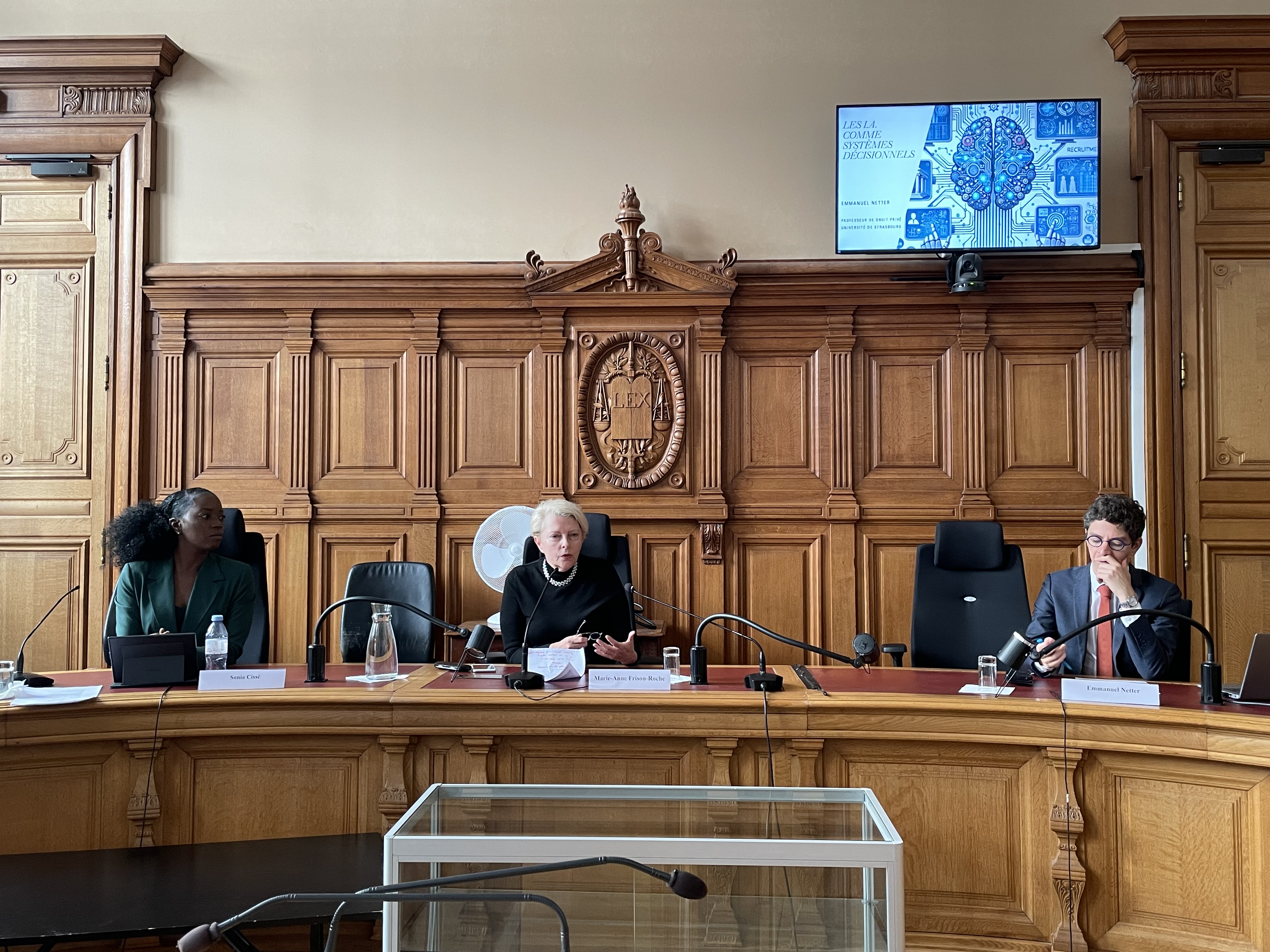
________
🕴️Fr. Ancel, 📝Quel rôle pour le juge aujourd’hui dans la compliance ? Quel office processuel du juge dans la compliance ?, in 🏛️Conseil d'État et 🏛️Cour de cassation, 📗De la régulation à la compliance : quel rôle pour le juge ?, 2024.
🕴️J. Carbonnier, 📝De minimis..., in 📗Mélanges dédiés à Jean Vincent, 1981.
🧮La vigilance, nouveau champ de contentieux systémique, in cycle de conférences-débats "Contentieux Systémique Émergent", organisé à l'initiative de la Cour d'appel de Paris, avec la Cour de cassation, la Cour d'appel de Versailles, l'École nationale de la magistrature (ENM) et l'École de formation des barreaux du ressort de la Cour d'appel de Paris (EFB), sous la responsabilité scientifique de Marie-Anne Frison-Roche, 26 avril 2024.

24 juin 2024
Organisation de manifestations scientifiques
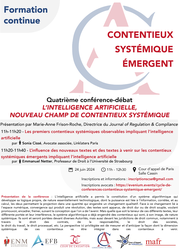
► Référence complète : L’intelligence artificielle, nouveau champ de contentieux systémique, in cycle de conférences-débats "Contentieux Systémique Émergent", organisé à l'initiative de la Cour d'appel de Paris, avec la Cour de cassation, la Cour d'appel de Versailles, l'École nationale de la magistrature (ENM) et l'École de formation des barreaux du ressort de la Cour d'appel de Paris (EFB), sous la responsabilité scientifique de Marie-Anne Frison-Roche, 24 juin 2024, 11h-12h30, Cour d'appel de Paris, salle Cassin
____
🌐consulter sur LinkedIn le compte-rendu de cette manifestation
____
► Présentation de la conférence : L'intelligence artificielle a permis la constitution d'un système algorithmique. Celui-ci développe une logique qui lui est propre, de nature essentiellement technologique. Elle engendre une puissance de calcul basée sur la mise en corrélation des informations pour fabriquer des possibles causalités et construire des probabilités que l'on assimile parfois à des "prédictions", la masse traitée finissant par engendrer un changement qualitatif.
Ce changement est lié à l'espace numérique, lequel par nature fait émerger un contentieux systémique, auquel a été consacré la conférence-débat du 27 mai 2024.
Le contentieux systémique est concerné de trois façons, qu'il s'agit ici d'anticiper car les contentieux sont pour l'instant naissants ou à venir mais vont sans doute advenir brutalement.
En premier lieu, il est possible que l'outil technologique permette de traiter certains dossiers dont la technicité, soit des notions soit des demandes, ou la multitude des demandes si simples soient-elles, requièrent cette aptitude à traiter la masse, ce qui engendre la montée en puissance à la fois de cette puissance mécanique algorithmique et la présence plus grande des êtres humains, notamment par l'accroissement de l'accusatoire, de la mise en état, des médiations, etc.
En deuxième lieu, , Face à ce changement lié à l'espace numérique, des "textes" sont apparus pour "réguler" l'usage ou l'invention même de tel ou tel outil algorithmique, textes de nature très diverses, de plus souple ou plus dur (cette variation entre droit souple et droit dur est le thème repris dans la conférence-débat du 19 septembre 2024). Il peut s'agir de dispositifs pris par les entreprises qui produisent les outils, par celles qui les utilisent, par celles qui les diffusent, les personnes concernées par les informations étant relativement actives. Ce dernier point expliquent que des contentieux systémiques sont déjà en cours et portent sur les droits subjectifs qui seraient violés soit par nature du fait de l'intelligence artificielle, en l'espèce les droits des créateurs, ou les droits à la vie privée, ou d'autres Buts Monumentaux. La dimension systémique, notamment extraterritoriale de ces contentieux, est déjà acquise.
Le troisième point est la part du Politique, puisque l'Union Européenne par les textes en cours d'adoption a posé que le But n'est pas seulement la durabilité du système technique, le marché de l'innovation, la souveraineté européenne, mais aussi la primauté des personnes, à travers une méthode qui est la hiérarchisation Ex Ante des risques. Cette conception assumée est aussi contestée. Cette question méthodologique se pose aussi au juge.
Ces contentieux systémiques émergents sont et seront portées devant diverses Autorités, de régulation ou de supervision, mais aussi devant les juridictions de droit commun, notamment à travers le droit des contrats, de la responsabilité, le droit des sociétés, le droit du travail, le droit processuel, etc.
La perspective ici privilégiée est de mesurer et d'anticiper la façon dont la dimension systémique de ces contentieux va être intégrer dans ces contentieux à venir.
____
🧮Programme de cette manifestation :
Quatrième conférence-débat
L’INTELLIGENCE ARTIFICIELLE, NOUVEAU CHAMP DE CONTENTIEUX SYSTÉMIQUE
Cour d’appel de Paris, salle Cassin
Présentation et modération par 🕴️Marie-Anne Frison-Roche, Professeure de Droit de la Régulation et de la Compliance, Directrice du Journal of Regulation & Compliance (JoRC)
🕰️11h-11h10. 🎤Les deux rencontres entre l'intelligence artificielle et le Contentieux Systémique, par 🕴️Marie-Anne Frison-Roche, Professeure de Droit de la Régulation et de la Compliance, Directrice du Journal of Regulation & Compliance (JoRC)
🕰️11h10-11h30. 🎤Les premiers contentieux systémiques observables impliquant l’intelligence artificielle, par 🕴️Sonia Cissé, Avocate Associée, Linklaters Paris
🕰️11h30-11h50. 🎤L’influence des nouveaux textes et des textes à venir sur les contentieux systémiques émergents impliquant l’intelligence artificielle, par 🕴️Emmanuel Netter, Professeur de Droit à l'Université de Strasbourg
🕰️11h50-12h30. Débat
____
🔴Les inscriptions et renseignements se font à l’adresse : inscriptionscse@gmail.com
🔴Pour les avocats, les inscriptions se font à l’adresse suivante : https://evenium.events/cycle-de-conferences-contentieux-systemique-emergent/
⚠️Les conférences-débat se tiennent en présentiel à la Cour d’appel de Paris.
____
🧮Lire ci-dessous la présentation détaillée de la manifestation faite par Marie-Anne Frison-Roche⤵️
20 juin 2024
Base Documentaire : Doctrine
► Référence complète : V.-O. Dervieux, "Israël à Eurosatory : la justice éparpillée « façon puzzle » ?", Actu-Juridique.fr, 20 juin 2024.
____
19 juin 2024
Base Documentaire : 02. Cour de cassation
19 juin 2024
Base Documentaire : Soft Law
► Référence complète : Commission d'enquête du Sénat, Les moyens mobilisés et mobilisables par l’État pour assurer la prise en compte et le respect par le groupe TotalEnergies des obligations climatiques et des orientations de la politique étrangère de la France, juin 2024, 350 p.
____
📓lire les comptes rendus des auditions
____
________
18 juin 2024
Base Documentaire : 08. Juridictions du fond
► Référence complète : Cour d'appel de Paris, Pôle 5, Chambre 12, 18 juin 2024, n° RG 23/14348, TotalEnergies
____
____
🏛️consulter une présentation de l'arrêt rendu le même jour dans l'affaire dite Suez
____
🏛️consulter une présentation de l'arrêt rendu le même jour dans l'affaire dite EDF
____
📰lire le communiqué de presse accompagnant le prononcé de ces trois arrêts
____
📝Commentaires de cette décision :
- Rev. int. compliance, n°4, 30 juillet 2024, act. 135
________
18 juin 2024
Base Documentaire : 08. Juridictions du fond
► Référence complète : Cour d'appel de Paris, Pôle 5, Chambre 12, 18 juin 2024, n° RG 23/10583, Suez
____
____
🏛️consulter une présentation de l'arrêt rendu le même jour dans l'affaire dite TotalEnergies
____
🏛️consulter une présentation de l'arrêt rendu le même jour dans l'affaire dite EDF
____
📰lire le communiqué de presse accompagnant le prononcé de ces trois arrêts
____
📝Commentaires de cette décision :
- Rev. int. compliance, n°4, 30 juillet 2024, act. 135
________
18 juin 2024
Base Documentaire : 08. Juridictions du fond
► Référence complète : Cour d'appel de Paris, Pôle 5, Chambre 12, 18 juin 2024, n° RG 21/22319, EDF
____
____
🏛️consulter une présentation de l'arrêt rendu le même jour dans l'affaire dite TotalEnergies
____
🏛️consulter une présentation de l'arrêt rendu le même jour dans l'affaire dite Suez
____
📰lire le communiqué de presse accompagnant le prononcé de ces trois arrêts
____
📝Commentaires de cette décision :
- Rev. int. compliance, n°4, 30 juillet 2024, act. 135
________
13 juin 2024
Base Documentaire : 06.1. Textes de l'Union Européenne
► Référence complète : Directive (UE) 2024/1760 du Parlement européen et du Conseil du 13 juin 2024 sur le devoir de vigilance des entreprises en matière de durabilité et modifiant la directive (UE) 2019/1937 et le règlement (UE) 2023/2859 (en anglais corporate sustainability due diligence directive, dite "CS3D")
____
____
📧consulter sur LinkedIn l'article publié par Marie-Anne Frison-Roche dans la Newsletter MAFR. Regulation, Compliance, Law, à l'occasion de la publication au Journal officiel de l'Union européenne de cette directive
____
📝commentaires de ce texte :
________
13 juin 2024
Base Documentaire : 02. Lois
► Référence complète : Loi n°2024-537 du 13 juin 2024 visant à accroître le financement des entreprises et l’attractivité de la France, J.O. 14 juin 2024
____
📝lire la loi
____
Son article 25 dispose : "La section 5 du chapitre I er du titre I er article L. 311-16-1 ainsi rédigé : du livre III du code de l’organisation judiciaire est complétée par un « Art. L. 311-16-1. – La cour d’appel de Paris, qui comprend une chambre commerciale internationale, connaît : « 1 o Des recours en annulation des sentences rendues en matière d’arbitrage international, dans les cas et les conditions prévus par le code de procédure civile ; « 2 o Des recours contre une décision qui statue sur une demande de reconnaissance ou d’exequatur d’une sentence rendue en matière d’arbitrage international, dans les cas et les conditions prévus par le même code. »
____
13 juin 2024
Interviews

► Référence complète : M.-A. Frison-Roche, "Entreprises et compliance : une justice et des juges plus offensifs", entretien mené par J.-Ph. Denis à l'occasion d'une série d'entretiens sur le Droit de la Compliance, in Fenêtres ouvertes sur la gestion, émission de J.-Ph. Denis, Xerfi Canal, enregistré le 12 décembre 2023, diffusé le 14 juin 2024
____
🌐consulter sur LinkedIn la présentation en décembre 2023 de l'entretien
____
🌐consulter sur LinkedIn la vidéo de l'entretien
____
🧱 consulter la présentation générale de cette série d'entretiens sur le Droit de la Compliance
____
🎥visionner l'interview complète sur Xerfi Canal
____
► Point de départ : depuis 2016, Marie-Anne Frison-Roche construit le Droit de la Compliance, notamment par une collection coéditée en français avec les Editions Dalloz et coéditée en anglais avec les Editions Bruylant :
🧱lire la présentation de la collection en langue française, Régulations & Compliance ➡️cliquer ICI
🧱read the presentation of the series in English, Compliance & Regulation ➡️cliquer ICI
____
► Résumé de l'entretien :
Jean-Philippe Denis. Question :
Marie-Anne Frison-Roche. Réponse. :
___
J.-Ph D. Q. : Ainsi
MaFR. R. : Oui,
____
J.-Ph. D. Q. : Ainsi
MaFR. R. : Oui,
________
13 juin 2024
Base Documentaire : 06.1. Textes de l'Union Européenne
► Référence complète : Règlement (UE) 2024/1689 du Parlement européen et du Conseil du 13 juin 2024 établissant des règles harmonisées concernant l’intelligence artificielle et modifiant les règlements (CE) n° 300/2008, (UE) n° 167/2013, (UE) n° 168/2013, (UE) 2018/858, (UE) 2018/1139 et (UE) 2019/2144 et les directives 2014/90/UE, (UE) 2016/797 et (UE) 2020/1828 (règlement sur l’intelligence artificielle) (en anglais Artificial Intelligence Act, dit "IA Act")
____
________
13 juin 2024
Responsabilités éditoriales : Direction de la collection "Régulations & Compliance", JoRC & Dalloz
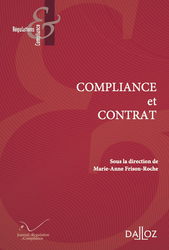
► Référence complète : M.-A. Frison-Roche (dir.), Compliance et Contrat, coll. "Régulations & Compliance", Journal of Regulation & Compliance (JoRC) et Dalloz, à paraître.
____
📘Parallèlement, un ouvrage en anglais, Compliance & Contract, est publié dans la collection éditée par le Journal of Regulation & Compliance (JoRC) et les Éditions Bruylant.
____
🧮Cet ouvrage vient à la suite d'un cycle de colloques 2023 organisés par le Journal of Regulation & Compliance (JoRC) et des Universités qui lui sont partenaires.
____
📚Ce volume s'insère dans la lignée des ouvrages qui dans cette collection sont consacrés à la Compliance.
► Lire les présentations des autres ouvrages de la Collection portant sur la Compliance :
- les ouvrages suivants :
🕴️M.A. Frison-Roche (dir.), 📕Le système probatoire de la Compliance, 2025
- les ouvrages précédents :
🕴️M.A. Frison-Roche (dir.), 📕L'obligation de Compliance, 2024
🕴️M.A. Frison-Roche et M. Boissavy (dir.), 📕Compliance & droits de la défense. Enquête interne - CJIP - CRPC, 2024
🕴️M.A. Frison-Roche (dir.), 📕La juridictionnalisation de compliance, 2023
🕴️M.A. Frison-Roche (dir.), 📕Les buts monumentaux de la Compliance, 2022
🕴️M.A. Frison-Roche (dir.), 📕Les outils de la Compliance, 2021
🕴️M.A. Frison-Roche (dir.), 📕Pour une Europe de la Compliance, 2019
🕴️N. Borga, 🕴️J.-Cl. Marin et 🕴️J-.Ch. Roda (dir.), 📕Compliance : Entreprise, Régulateur, Juge, 2018
🕴️M.A. Frison-Roche (dir.), 📕Régulation, Supervision, Compliance, 2017
🕴️M.A. Frison-Roche (dir.), 📕Internet, espace d'interrégulation, 2016
📚Consulter tous les autres titres de la collection.
___
► Présentation générale de l'ouvrage : L'ouvrage précédemment publié dans la collection "Régulations & Compliance" porte sur L'obligation de Compliance. Le contrat y est évoqué, non seulement parce qu'en soi le contrat est source d'obligations, mais encore parce qu'en pratique les entreprises ont rapidement contractualisé leur obligation légale de compliance.
____
🏗️Construction générale de l'ouvrage :
________
12 juin 2024
Conférences

🌐suivre Marie-Anne Frison-Roche sur LinkedIn
🌐s'abonner à la Newsletter MAFR Regulation, Compliance, Law
____
► Référence complète : M.-A. Frison-Roche, Participation au panel "Une Gouvernance responsable : vers un mieux vivre ensemble ?", in Grenelle du Droit 5. L'avenir de la filière juridique, Association française des juristes d'entreprise (AFJE), Cercle Montesquieu et Université Paris Panthéon-Sorbonne, Campus Port-Royal Université Paris 1 Panthéon-Sorbonne, 1 rue de la Glacière, 75013 Paris, 12 juin 2024
____
🧮Consulter le programme complet de cette manifestation
____
🎥regarder l'interview fait juste après cette table-ronde
____
🪑🪑🪑🪑🪑participent également à cette table-ronde :
🕴️Yves Garagnon, président de Dilitrust,
🕴️Pierrick Le Goff, avocat à la Cour, associé du cabinet De Gaulle Fleurance,
🕴️Sabine Lochmann, présidente d'Ascend,
🕴️Vincent Vigneau, président de la chambre commerciale, économique et financière de la Cour de cassation
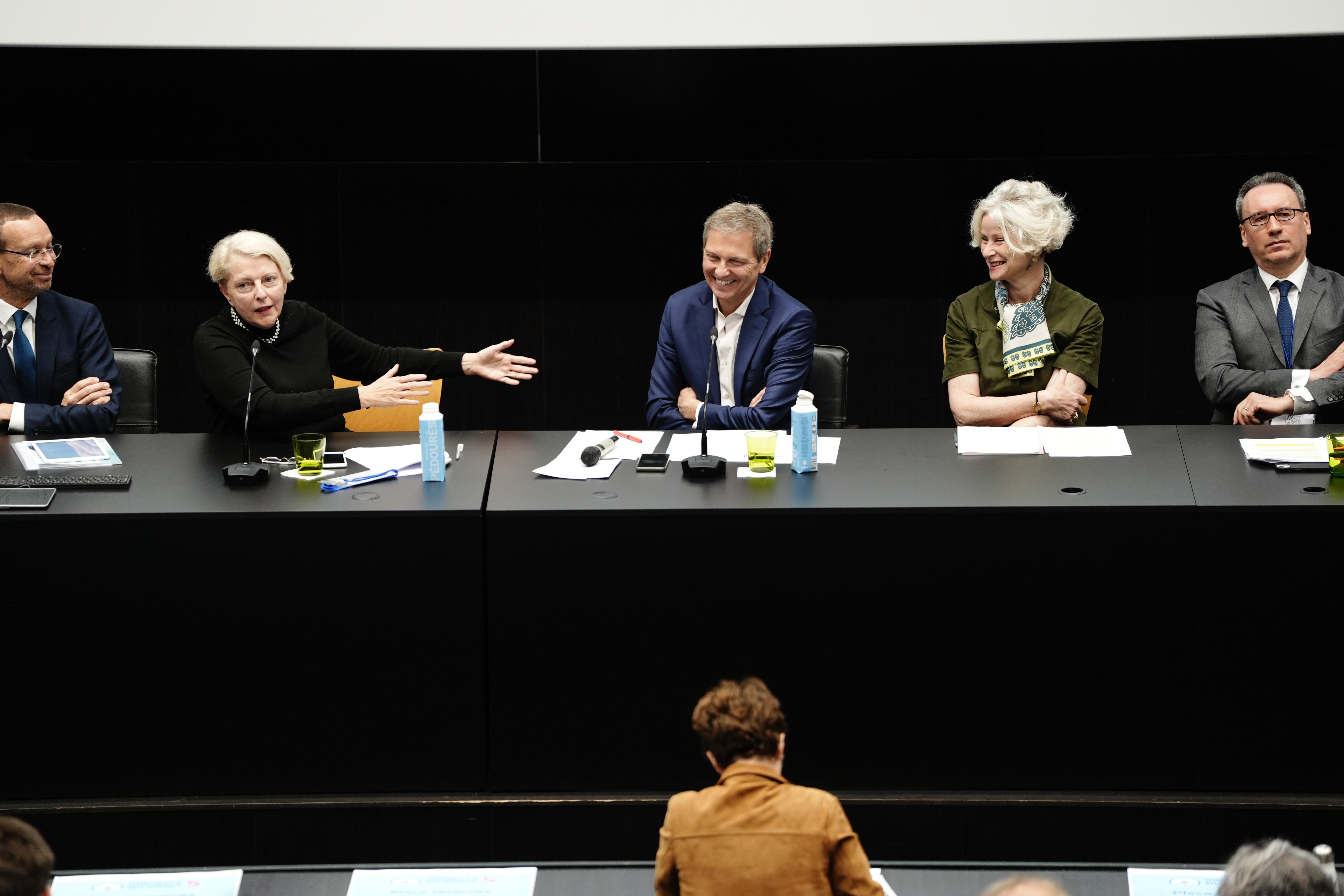
____
► Présentation de mon intervention dans cette table-ronde d'ouverture de la manifestation : Dans cette table-ronde plénière qui ouvre la manifestation consacrée au thème de la "gouvernance responsable", en raison de mes travaux l'occasion me sera donnée d'aborder plus particulièrement les différentes perspectives :
- en quoi le nouveau Droit de la Compliance qui concrétise la responsabilité des entreprises dans un nouveau rapport avec les États et avec la société sociale constitue une "révolution juridique",
💡pour mémoire, mafr,📝Le droit de la compliance, 2016 ; (dir.) 📕Les buts monumentaux de la compliance, 2022
- en quoi le jugement rendu par le Tribunal judiciaire de Paris le 28 février 2023 est remarquable et constitue d'ores et déjà un tournant dans la jurisprudence,
💡pour mémoire, mafr, 🎤audition comme amica curiae, audience du 26 octobre 2022 devant le Tribunal judiciaire de Paris ; (dir.) 📕La juridictionnalisation de la compliance, 2023
- en quoi le rapport entre les États et les entreprises est renouvelé par ce mouvement juridique profond que la Compliance exprime,
💡pour mémoire, mafr et M. Boissavy (dir.), 📕Compliance et droits de la défense - Enquêtes internes, CJIP, CRPC, mafr (dir.), 📕L'obligation de compliance, 2024
- en quoi les juristes d'entreprises ont un rôle décisif et central à jouer dans ce mouvement, notamment dans le mécanisme de vigilance, "pointe avancée" du Droit de la Compliance,
💡pour mémoire, mafr, 📝Contrat de compliance, clause de compliance, 2023 ; (dir.), 📕Compliance et contrat, 2025
- en quoi consiste cette "responsabilité Ex Ante" des entreprises, qui n'entraîne pas pour autant sa responsabilité Ex Post, distinction dont les juristes sont les gardiens,
💡pour mémoire, mafr, 📝La responsabilité Ex Ante, pilier du Droit de la Compliance, 2021
- en quoi le droit européen de la compliance est profondément humaniste, identité qui distingue la compliance européenne de la Compliance américaine et, surtout de la Compliance chinoise.
💡pour mémoire, mafr (dir.), 📕Pour une Europe de la Compliance, 2017
____
Lire le compte-rendu de cette table-ronde fait par Delphine Bauer le 8 juillet 2024 dans Actu-Juridique
________
6 juin 2024
Responsabilités éditoriales : Direction de la collection "Cours-Série Droit privé", Editions Dalloz (34)

► Référence complète : S. Piédelièvre, Droit commercial (Actes de commerce - Commerçants - Fonds de commerce - Concurrence - Consommation), Dalloz, coll. "Cours Dalloz-Série Droit privé", 1ière éd., 1997, 14ième éd., 2024, 480 p.
____
► Présentation générale de l'ouvrage : Cet ouvrage, qui s’adresse principalement aux étudiants de L2 et L3, propose une approche claire et détaillée de la notion de commercialité. Il intéressera également les praticiens souhaitant actualiser leurs connaissances en droit commercial.
Complexe dans le système français, cette notion suscite de nombreuses questions appelant des solutions concrètes d’une grande importance comme les régimes de compétence et de preuve. Cet ouvrage aborde la question du droit commercial à travers les actes de commerce, les commerçants, les fonds de commerce, ainsi que la concurrence et la consommation.
L’auteur s’est appliqué à présenter les règles qui constituent les principes de l’activité marchande.
____
📕lire la quatrième de couverture
____
____
📚consulter l'ensemble de la collection dans lequel l'ouvrage a été publié
________
3 juin 2024
Base Documentaire : Convention, contrat, composition, engagement
► Référence complète : N. Yax, H. Anlio & S. Palminteri, "Studying and improving reasoning in humans and machines", Communications Psychology volume 2, Article number: 51 (2024)
____
31 mai 2024
Base Documentaire : 06.1. Textes de l'Union Européenne
► Référence complète : Directive (UE) 2024/1640 du Parlement européen et du Conseil du 31 mai 2024 relative aux mécanismes à mettre en place par les États membres pour prévenir l’utilisation du système financier aux fins du blanchiment de capitaux ou du financement du terrorisme, modifiant la directive (UE) 2019/1937, et modifiant et abrogeant la directive (UE) 2015/849
____
________
31 mai 2024
Base Documentaire : 06.1. Textes de l'Union Européenne
► Référence complète : Règlement (UE) 2024/1620 du Parlement européen et du Conseil du 31 mai 2024 instituant l’Autorité de lutte contre le blanchiment de capitaux et le financement du terrorisme et modifiant les règlements (UE) n° 1093/2010, (UE) n° 1094/2010 et (UE) n° 1095/2010
____
________
31 mai 2024
Base Documentaire : 06.1. Textes de l'Union Européenne
► Référence complète : Règlement (UE) 2024/1624 du Parlement européen et du Conseil du 31 mai 2024 relatif à la prévention de l’utilisation du système financier aux fins du blanchiment de capitaux ou du financement du terrorisme
____
________
30 mai 2024
Base Documentaire : Doctrine
► Référence complète : Th. Douville, "De l'approche extensive de la prise de décision exclusivement automatisée (à propos du refus d'un prêt fondé sur une note de solvabilité communiquée par un tiers)", D. 2024, pp. 1000-1004
____
🦉Cet article est accessible en texte intégral pour les personnes inscrites aux enseignements de la Professeure Marie-Anne Frison-Roche
________
27 mai 2024
Conférences

🌐suivre Marie-Anne Frison-Roche sur LinkedIn
🌐s'abonner à la Newsletter MAFR Regulation, Compliance, Law
____
► Référence complète : M.-A. Frison-Roche, "Un contentieux systémique in vivo : le cas dit des sites pornographiques", in Les contrôles techniques des risques présents sur les plateformes et les contentieux engendrés, in cycle de conférences-débats "Contentieux Systémique Émergent", organisé à l'initiative de la Cour d'appel de Paris, avec la Cour de cassation, la Cour d'appel de Versailles, l'École nationale de la magistrature (ENM) et l'École de formation des barreaux du ressort de la Cour d'appel de Paris (EFB), sous la responsabilité scientifique de Marie-Anne Frison-Roche, 27 mai 2024, 9h-10h30, Cour d'appel de Paris, salle Cassin
____
🧮consulter le programme complet de cette manifestation
____
🧮consulter le programme de l'ensemble du cycle Contentieux Systémique Émergent
____
🔲consulter les slides ayant servi de support à l'intervention
____
🌐consulter sur LinkedIn les slides ayant servi de support à l'intervention
____
🎤consulter une présentation de la seconde intervention de Marie-Anne Frison-Roche prononcée lors de cette conférence-débat : "Le contentieux Systémique Emergent du fait du système numérique"
____
____
____
► Résumé de cette conférence :
________

27 mai 2024
Organisation de manifestations scientifiques

► Référence complète : Les contrôles techniques des risques présents sur les plateformes et les contentieux engendrés, in cycle de conférences-débats "Contentieux Systémique Émergent", organisé à l'initiative de la Cour d'appel de Paris, avec la Cour de cassation, la Cour d'appel de Versailles, l'École nationale de la magistrature (ENM) et l'École de formation des barreaux du ressort de la Cour d'appel de Paris (EFB), sous la responsabilité scientifique de Marie-Anne Frison-Roche, 27 mai 2024, 9h-10h30, Cour d'appel de Paris, salle Cassin
____
🧮consulter le programme complet du cycle Contentieux Systémique Émergent
____
🌐consulter sur LinkedIn le compte-rendu de cette manifestation
____
🧱lire ci-dessous le compte-rendu de cette manifestation⤵️
____
► Présentation de la conférence : L'espace numérique est un espace de risques. Certains y sont naturellement associés, parce qu'il s'agit d'un espace de libertés, d'autres doivent être contrés parce qu'ils sont associés à des comportements interdits d'une façon générale, par exemple le blanchiment d'argent. Mais l'espace numérique a développé des risques qui, par leur ampleur ont été transformés dans leur nature même : il en est ainsi notamment de la déformation imprégnant certains contenus et de l'insécurité qui peut menacer l'ensemble du système lui-même. Le Droit a alors confié aux opérateurs eux-mêmes la vigilance sur ce qui sont devenus des "cyber-risques", comme le risque de désinformation, le risque de destruction des infrastructures de communication, le risque de vol de données, perspective systémique qui peut faire s'effondrer les sociétés elles-mêmes.
De nouveaux textes sont élaborées, notamment le Digital Services Act, pour à la fois accroître les charges et les pouvoirs des entreprises en la matière, les entreprises numériques étant en première ligne, mais aussi les autorités de supervision, comme l'Arcom. Les contentieux qui en naissent, dans lesquels entreprises et régulateurs peuvent être alliés ou en opposition, sont par nature systémiques.
Le traitement par le juge de ces "causes systémiques", par la procédure et les solutions, doit répondre à cette dimension systémique. Le cas dit des "sites pornographiques", qui est en train de se dérouler, permet d'observer in vivo le dialogue des juges lorsqu'une "cause systémique" s'impose à eux.
____
🧮Programme de cette manifestation :
Troisième conférence-débat
LES CONTROLES TECHNIQUES DES RISQUES PRESENTS SUR LES PLATEFORMES ET LES CONTENTIEUX ENGENDRES
Cour d’appel de Paris, salle Cassin
modération par 🕴️Marie-Anne Frison-Roche, Professeure de Droit de la Régulation et de la Compliance, Directrice du Journal of Regulation & Compliance (JoRC)
🕰️9h-9h10. 🎤Le contentieux Systémique Emergent du fait du système numérique, 🕴️Marie-Anne Frison-Roche
🕰️9h10-9h30. 🎤Les techniques de gestion du risque systémique pesant sur la cybersécurité des plateformes, 🕴️Michel Séjean, Professeur de droit à l'Université Sorbonne Paris Nord
🕰️9h30-9h50. 🎤Un système systémique in vivo : le cas dit des sites pornographiques,🕴️Marie-Anne Frison-Roche
🕰️9h50-10h10. 🎤Les obligations systémiques des opérateurs numériques à travers le Règlement sur les Services Numériques (RSN/DSA) et le rôle des régulateurs, par 🕴️Roch-Olivier Maistre, Président de l’Autorité de régulation de la communication audiovisuelle et numérique (Arcom)
🕰️10h10-10h30. Débat
____
🔴Les inscriptions et renseignements se font à l’adresse : inscriptionscse@gmail.com
🔴Pour les avocats, les inscriptions se font à l’adresse suivante : https://evenium.events/cycle-de-conferences-contentieux-systemique-emergent/
⚠️Les conférences-débat se tiennent en présentiel à la Cour d’appel de Paris.
________